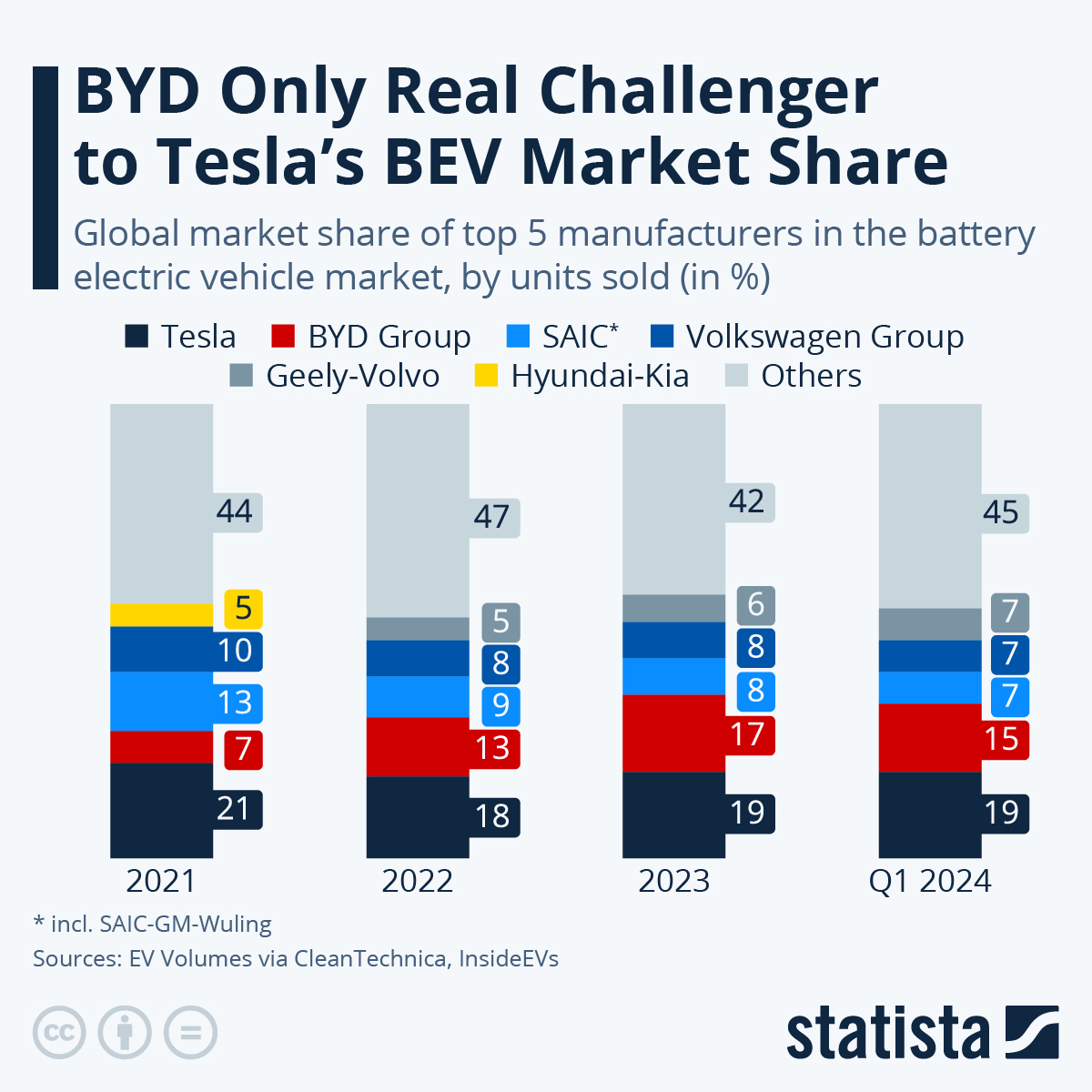
In the second quarter of 2024, Tesla's gross margin dropped to a new low after declining every quarter since Q1 2022. Thanks to an uptick in deliveries over the past months, the U.S. automaker and pioneer of getting battery electric vehicles (BEVs) to the mass market still retained the biggest market share among all BEVs sold worldwide.
In the past year and the first three months of 2024, Tesla's share was constant at 19 percent, according to analyses by EV Volumes and Inside EVs for the corresponding periods.
The competition, however, is hot on its heels.
As Statista;s Florian Zandt shows in the chart below, the Chinese conglomerate, which produces standalone electric vehicle batteries and associated electronics in addition to plug-in hybrid and fully electric vehicles, increased its market share by ten percentage points between 2021 and 2023. The BEV portfolio of legacy automakers like Volkswagen and Geely-Volvo stood at seven percent, on par with SAIC, which includes the joint venture between the Chinese state-owned SAIC Motor and Wuling as well as General Motors.
While the first quarter saw BYD's share drop by two points, it was only 18,000 cars shy of Tesla's deliveries between April and June 2024, illustrating how close the head-to-head race between these two companies is.
BYD is focused on providing BEVs to a more general consumer base, while Tesla's products have a higher price tag.
This difference might be slightly mitigated through the increase of tariffs on Chinese-made cars from 25 to 100 percent announced in May and coming into effect in early August, a move that simultaneously seeks to boost domestic sales and will likely increase tensions between the People's Republic and the United States.
According to EV Volumes, 14 million electric vehicles were sold globally in 2023, 70 percent of which were BEVs. However, 84 percent of all light vehicles sold still ran on traditional combustion engines or other non-electric fuel sources.
The biggest exporter and market for both hybrids and BEVs was China with shares of 65 and 59 percent, respectively.
In the second quarter of 2024, Tesla’s gross margin dropped to a new low after declining every quarter since Q1 2022. Thanks to an uptick in deliveries over the past months, the U.S. automaker and pioneer of getting battery electric vehicles (BEVs) to the mass market still retained the biggest market share among all BEVs sold worldwide.
In the past year and the first three months of 2024, Tesla’s share was constant at 19 percent, according to analyses by EV Volumes and Inside EVs for the corresponding periods.
The competition, however, is hot on its heels.
As Statista;s Florian Zandt shows in the chart below, the Chinese conglomerate, which produces standalone electric vehicle batteries and associated electronics in addition to plug-in hybrid and fully electric vehicles, increased its market share by ten percentage points between 2021 and 2023. The BEV portfolio of legacy automakers like Volkswagen and Geely-Volvo stood at seven percent, on par with SAIC, which includes the joint venture between the Chinese state-owned SAIC Motor and Wuling as well as General Motors.
While the first quarter saw BYD’s share drop by two points, it was only 18,000 cars shy of Tesla’s deliveries between April and June 2024, illustrating how close the head-to-head race between these two companies is.
BYD is focused on providing BEVs to a more general consumer base, while Tesla’s products have a higher price tag.
This difference might be slightly mitigated through the increase of tariffs on Chinese-made cars from 25 to 100 percent announced in May and coming into effect in early August, a move that simultaneously seeks to boost domestic sales and will likely increase tensions between the People’s Republic and the United States.
According to EV Volumes, 14 million electric vehicles were sold globally in 2023, 70 percent of which were BEVs. However, 84 percent of all light vehicles sold still ran on traditional combustion engines or other non-electric fuel sources.
The biggest exporter and market for both hybrids and BEVs was China with shares of 65 and 59 percent, respectively.
Loading…





